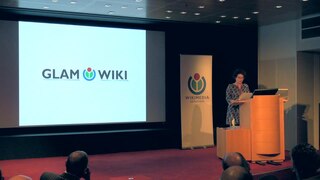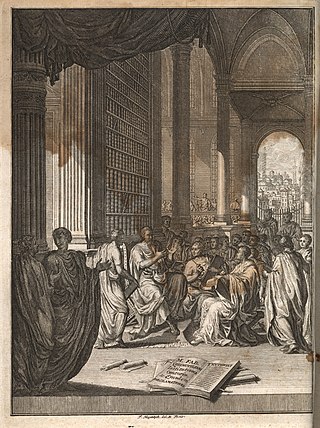
Public speaking, also called oratory, is the act or skill of delivering speeches on a subject before a live audience.

Rhetoric is the art of persuasion. It is one of the three ancient arts of discourse (trivium) along with grammar and logic/dialectic. As an academic discipline within the humanities, rhetoric aims to study the techniques that speakers or writers use to inform, persuade, and motivate their audiences. Rhetoric also provides heuristics for understanding, discovering, and developing arguments for particular situations.

Isocrates was an ancient Greek rhetorician, one of the ten Attic orators. Among the most influential Greek rhetoricians of his time, Isocrates made many contributions to rhetoric and education through his teaching and written works.

Kairos is an ancient Greek word meaning 'the right or critical moment'. In modern Greek, kairos also means 'weather' or 'time'.

Eloquence is fluent, elegant, persuasive, and forceful speech, persuading an audience. Eloquence is both a natural talent and improved by knowledge of language, study of a specific subject to be addressed, philosophy, rationale and ability to form a persuasive set of tenets within a presentation.

Rhetorical criticism analyzes the symbolic artifacts of discourse—the words, phrases, images, gestures, performances, texts, films, etc. that people use to communicate. Rhetorical analysis shows how the artifacts work, how well they work, and how the artifacts, as discourse, inform and instruct, entertain and arouse, and convince and persuade the audience; as such, discourse includes the possibility of morally improving the reader, the viewer, and the listener. Rhetorical criticism studies and analyzes the purpose of the words, sights, and sounds that are the symbolic artifacts used for communications among people.
Pathos appeals to the emotions and ideals of the audience and elicits feelings that already reside in them. Pathos is a term used most often in rhetoric, as well as in literature, film and other narrative art.

Inventio, one of the five canons of rhetoric, is the method used for the discovery of arguments in Western rhetoric and comes from the Latin word, meaning "invention" or "discovery". Inventio is the central, indispensable canon of rhetoric, and traditionally means a systematic search for arguments.

Dispositio is the system used for the organization of arguments in the context of Western classical rhetoric. The word is Latin, and can be translated as "organization" or "arrangement".

Elocutio is a Latin term for the mastery of rhetorical devices and figures of speech in Western classical rhetoric. Elocutio or style is the third of the five canons of classical rhetoric that concern the craft and delivery of speeches and writing.

Pronuntiatio was the discipline of delivering speeches in Western classical rhetoric. It is one of the five canons of classical rhetoric that concern the crafting and delivery of speeches. In literature the equivalent of ancient pronuntiatio is the recitation of epics.

Aristotle's Rhetoric is an ancient Greek treatise on the art of persuasion, dating from the 4th century BCE. The English title varies: typically it is Rhetoric, the Art of Rhetoric, On Rhetoric, or a Treatise on Rhetoric.

Owing to its origin in ancient Greece and Rome, English rhetorical theory frequently employs Greek and Latin words as terms of art. This page explains commonly used rhetorical terms in alphabetical order. The brief definitions here are intended to serve as a quick reference rather than an in-depth discussion. For more information, click the terms.

De Oratore is a dialogue written by Cicero in 55 BC. It is set in 91 BC, when Lucius Licinius Crassus dies, just before the Social War and the civil war between Marius and Sulla, during which Marcus Antonius (orator), the other great orator of this dialogue, dies. During this year, the author faces a difficult political situation: after his return from exile in Dyrrachium, his house was destroyed by the gangs of Clodius in a time when violence was common. This was intertwined with the street politics of Rome.

The epideictic oratory, also called ceremonial oratory, or praise-and-blame rhetoric, is one of the three branches, or "species" (eidē), of rhetoric as outlined in Aristotle's Rhetoric, to be used to praise or blame during ceremonies.

Institutio Oratoria is a twelve-volume textbook on the theory and practice of rhetoric by Roman rhetorician Quintilian. It was published around year 95 AD. The work deals also with the foundational education and development of the orator himself.
Rhetorical stance refers to the deliberate choices made by a communicator in shaping and presenting their message. It encompasses the strategic decisions regarding language, style, and tone that are employed to achieve a specific communicative purpose. This concept is deeply rooted in rhetorical theory and is a fundamental aspect of effective communication across various disciplines, including literature, public speaking, and academic writing.

The rhetorical situation is an event that consists of an issue, an audience, and a set of constraints. A rhetorical situation arises from a given context or exigence. An article by Lloyd Bitzer introduced the model of the rhetorical situation in 1968, which was later challenged and modified by Richard E. Vatz (1973) and Scott Consigny (1974). More recent scholarship has further redefined the model to include more expansive views of rhetorical operations and ecologies.

Orator was written by Marcus Tullius Cicero in the latter part of the year 46 BC. It is his last work on rhetoric, three years before his death. Describing rhetoric, Cicero addresses previous comments on the five canons of rhetoric: Inventio, Dispositio, Elocutio, Memoria, and Pronuntiatio. In this text, Cicero attempts to describe the perfect orator, in response to Marcus Junius Brutus’ request. Orator is the continuation of a debate between Brutus and Cicero, which originated in his text Brutus, written earlier in the same year.
Ethopoeia (ee-tho-po-EE-ya) is the ancient Greek term for the creation of a character. Ethopoeia was a technique used by early students of rhetoric in order to create a successful speech or oration by impersonating a subject or client. Ethopoeia contains elements of both ethos and pathos and this is noticeable in the three divisions of ethopoeia. These three divisions are pathetical, ethical and mixed. It is essential to impersonation, one of the fourteen progymnasmata exercises created for the early schools of rhetoric.







